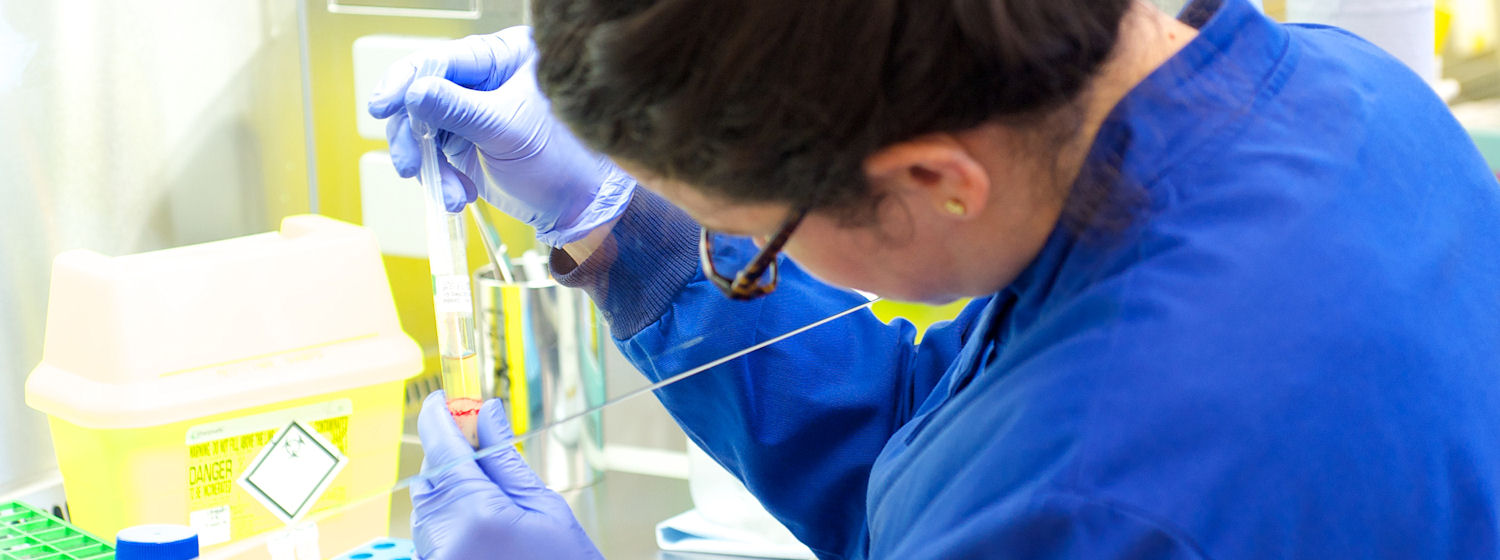We encourage our patients to participate in national and global clinical trials.
Our team
Our research is conducted in partnership with the University of Oxford and trials are led and overseen by the ILD consultants:
- Dr Rachel Hoyles
- Dr Peter Saunders
- Prof Ling-Pei Ho
- Dr Emily Fraser
They are supported by a team of research nurses and practitioners.
Our research trials
Current areas of research include trials of new treatments for IPF, as well as trials to improve symptoms such as cough.
Trials range in intensity and duration, and may be as short as three months, or up to a year, or sometimes longer. All trials that we undertake will have passed a stringent UK ethical review, and there are strict standards in place to protect the safety of trial participants.
Taking part in research
Involvement in a clinical trial will run alongside your usual care. Your health and wellbeing will remain the priority, and the clinical team will always ensure that you are on the most appropriate treatment available.
Your clinician may invite you to take part in a clinical trial. It is entirely your decision whether to take part, and if you prefer not to, it will not affect your care in any way. We are always happy to discuss the possible risks and benefits of taking part in a trial, without any obligation to take part. Similarly, should you change your mind during the trial, you are free to withdraw at any time.
Sometimes we can combine trial activity with your usual clinic visits, but usually participation in trials will involve more frequent visits to the hospital. If this is the case, travel and parking expenses will be refunded, and trial sponsors are often willing to fund taxis.
Trial visits will take place on the Churchill Hospital site, and depending on the trial, may be conducted in purpose-built facilities owned by the University. We appreciate that people have other commitments and aim to be as flexible as possible with visit times.
How to find the Churchill Hospital
How to get involved
If you are interested in being involved in research, please contact us.
Email: ortu.nurses@ndm.ox.ac.uk
With your consent, we can add your details to a secure, confidential database, with view to contacting you when a suitable trial is recruiting.
Trials recruiting
Vicore Aspire
Aim
This is a 52-week randomised, placebo-controlled trial assessing the efficacy of Buloxibutid in the treatment of patients with idiopathic pulmonary fibrosis.
The trial allows for patients not on current treatment or those on Nintedanib (at a stable dose).
Unfortunately patients on Pirfenidone cannot take part in this study.
What is involved
This study will involve having additional CT scans to the standard of care and may involve eye checks.
There will be eight visits over the course of a year and six phone contacts.
Email: ortu.nurses@ndm.ox.ac.uk
Avalyn MIST - AP01-007 - nebulised Pirfenidone / placebo trial in progressive pulmonary fibrosis
Aim
This is a phase 2b placebo-controlled multinational trial to evaluate the effect of nebulised Pirfenidone on slowing disease progression in progressive pulmonary fibrosis (non-IPF).
What is involved
12 visits over one year. Neither you nor the study team will know which drug you are taking. Participants can be on Nintedanib as long as it is a stable dose. You will need to administer a nebuliser at home and keep an electronic diary.
Email: ortu.nurses@ndm.ox.ac.uk
Calluna Aurora CAL 101-201
Aim
This is a 28-week trial testing the safety and efficacy of four weekly infusions of CAL101 in patients with idiopathic pulmonary fibrosis. This is a medication which binds to a protein called S100A4 and neutralises it. S100A4 protein is pro-fibrotic.
What is involved
10 visits of which seven involve receiving an intravenous infusion of the study medication or matched placebo. These visits will take place over 279 days. The study allows patients on background Nintedanib or Pirfenidone and those who are not currently on treatment
Email: emcrf@ouh.nhs.uk
Mediar MTX-463-1201
Aim
This is a 28-week trial testing the safety and efficacy of four weekly infusions of MTX-463 in patients with idiopathic pulmonary fibrosis. The medication is a neutralising antibody against a protein called WISP1 which is pro-fibrotic.
What is involved
Nine visits of which seven involve receiving an intravenous infusion of the study medication or matched placebo. These visits will take place over 196 days.
Email: emcrf@ouh.nhs.uk
Trials closed to further recruitment
Thank you to all our participants for taking part!
BMS 027065 (ALOFT IPF)
Phase 3 study looking to evaluate whether BMS-986278 (on oral lysophosphatidic acid receptor blocker) can slow the progression of pulmonary fibrosis over a 52-week period.
BMS 027015 (ALOFT PPF)
Phase 3 study looking to evaluate whether BMS-986278 (an oral lysophosphatidic acid receptor blocker) can slow the progression in patients who have the progressive fibrosis phenotype - this will include a wide range of lung diseases including rheumatoid arthritis, scleroderma, hypersensitivity pneumonitis and NSIP.
SNDX-6352-0506
Phase 2b study designed to evaluate whether Axalitimab infusions are safe and effective in treating pulmonary fibrosis over a 26-week period.
BI 1462-0004 (Autotaxin)
Study to test whether BI 1819479 (autotaxin inhibitor) improves lung function in patients with idiopathic pulmonary fibrosis.
BI 1305-0031 (Fibroneer-On)
Follow up study to test long term treatment with Nerandomilast in patients with pulmonary fibrosis.
TIPAL
Study looking at the impact of acid suppression with PPI in IPF.





























































